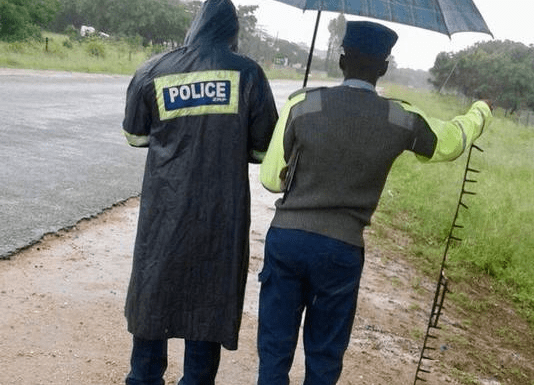Government yesterday said only standard roadblocks will be reduced to four per province, but numerous spot checks by police within cities and towns will remain in place, dampening celebrations by motorists and public transport operators who thought they would now get a reprieve from harassment by law enforcement agents.
A standard roadblock has a Police Ahead sign, drums and flashing lights.
Home Affairs Deputy Minister Cde Obedingwa Mguni said it is the standard roadblocks that have been reduced to four per province and what motorists called roadblocks along routes leading to city centres or growth points were in fact spot checks.
Giving oral evidence before a Parliamentary Portfolio Committee on Transport and Infrastructure Development in Harare on Monday, the Minister of Home Affairs Dr Ignatius Chombo, who was accompanied by his deputy Cde Mguni, said as from next week the police would unveil at least four standard roadblocks per province.
This was in response to concerns by tourists and motorists regarding the prevalence of police on the roads.
Public transporters and pirate taxi operators, who thought they would get a reprieve from what they termed police harassment at roadblocks, had their celebrations cut short following Cde Mguni’s explanation.
“A standard roadblock is one which consists of more than three officers, with the security barriers like drums, boomgates and other things that can be used to block or control traffic, signs to indicate that there are police ahead as well as a blue flashing light at night,” Cde Mguni said.
He said besides the standard roadblocks, there were highway patrols and checkpoints, where traffic police can stop motorists to check on some things as part of their duties.
“There are others which we call a highway patrol where the police can go with a patrol car and if they see a suspicious car they can stop it there and then and that can create something we call a checkpoint.
Checkpoints are set up when the police would have gathered information on a crime or are enforcing compliance with statutes. They set them up to check whether the information they have been given is accurate,” said Cde Mguni.
“Those standard roadblocks I mentioned are those that I said there could be one standard roadblock per district or four per province, that is what we are planning to do to reduce the roadblocks. But it doesn’t mean the checkpoints won’t be there, the highway patrols won’t be there; so people must not mix it up. Police are allowed to do spot checks, they are allowed to do highway patrols. This must be articulated correctly”.
“That’s an average of two roadblocks per two kilometres. The police are only there to frustrate motorists and demand bribes,” said the motorist who preferred anonymity. Mr Thabani Moyo, another resident who is among thousands of motorists who believed Dr Chombo meant checkpoints would be abolished, said: “This is a welcome development because we are tired of police stopping us here and there. For example, when one is travelling to Plumtree, they pass through an average of five roadblocks, which is too much considering that it’s a 100 kilometre highway.”
A taxi driver Mr Victor Mutasa said while the issue of four roadblocks was welcome, police would maximise on them to squeeze as much money out of motorists as possible.
“Few roadblocks mean more money to the motorist. The police will make sure that they identify as many offences as possible to make up for other roadblocks that would have been reduced,” said Mr Mutasa.
Kombi crews also expressed joy that they would operate “freely” as they would no longer be paying “tollgate fees”. All the celebrations came to an end when motorists were given Deputy Minister Mguni’s clarification. state media













